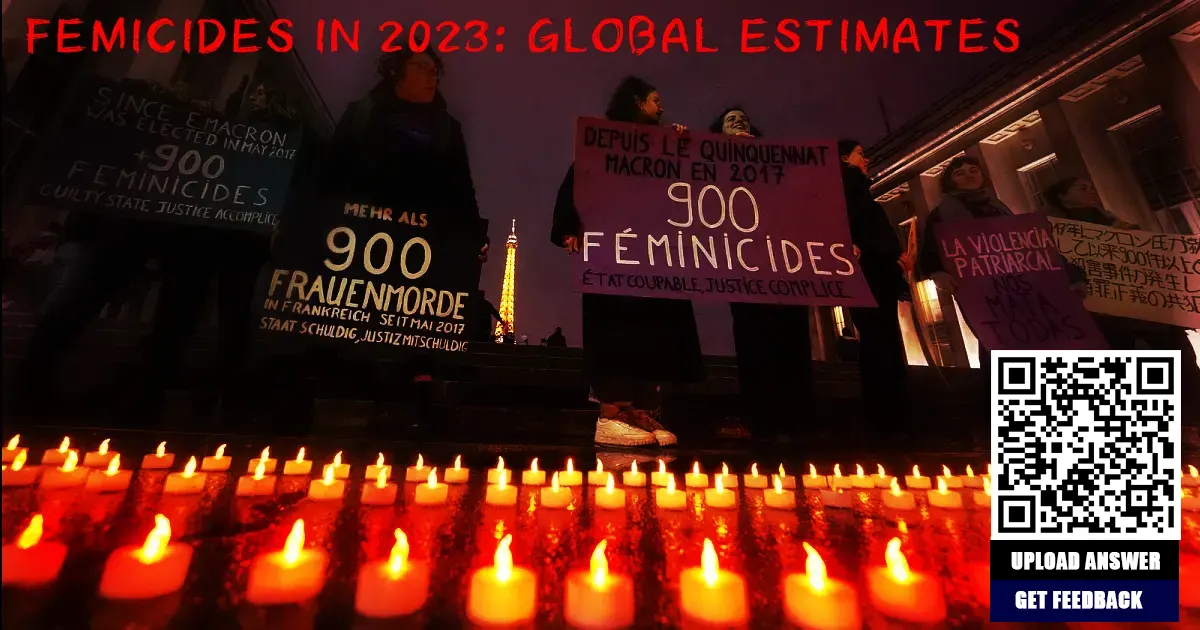
Context:
The Femicides in 2023: Global Estimates of Intimate Partner/Family Member Femicides report, jointly released by UN Women and the United Nations Office on Drugs and Crime (UNODC), was published on the International Day for the Elimination of Violence Against Women. The report highlights the intentional killing of women and girls based on their gender, driven by factors such as discrimination, unequal power dynamics, harmful social norms, and gender stereotypes.
Key Findings of the Report
- Global Scenario:
- In 2023, approximately 85,000 women and girls were deliberately killed worldwide.
- Around 60% of these killings (roughly 51,100) were perpetrated by intimate partners or family members, averaging 140 women and girls murdered daily by someone close to them.
- Regional Breakdown:
- Africa: Recorded the highest number of femicide victims (21,700) and the highest rate per population (2.9 per 100,000).
- The Americas and Oceania: Femicide rates stood at 1.6 and 1.5 per 100,000, respectively.
- Asia and Europe: Reported lower femicide rates of 0.8 and 0.6 per 100,000.
- Non-Domestic Femicide: Increasingly recognized, with 5% of femicides in France (2019–2022) and 9% in South Africa (2020–2021) occurring outside the domestic sphere.
- Gender-Based Violence Statistics:
- While men constituted 80% of homicide victims globally, women made up 20%.
- However, nearly 60% of women killed in 2023 were victims of intimate partner or family-related violence.
- Preventability:
Many victims had previously reported domestic violence. In France, 22–37% of women killed by intimate partners (2019–2022) had reported prior abuse, with similar trends observed in South Africa.
Forms of Violence Against Women
- Domestic Violence:
- Physical, emotional, or sexual harm inflicted by partners or family members, including physical assault, coercion, psychological abuse, and controlling behaviors.
- Cultural Abuse:
- Harmful practices such as female genital mutilation, child marriage, forced marriage, witch-branding, honor-based violence, and widowhood rituals.
- Psychological Abuse:
- Intimidation, humiliation, derogatory comments, and isolation, often violating women’s dignity and rights. Practices like isolating menstruating women and female infanticide fall under this category.
- Sexual Violence:
- Non-consensual sexual acts, disproportionately affecting women and girls. In India, over 31,000 rapes were reported in 2022, equating to nearly 87 cases daily.
- Technology-Facilitated Violence:
- Online harassment, cyberbullying, stalking, doxing (public release of private information), and the distribution of deepfake or morphed videos targeting women.
Gender Violence in India
- Rise in Crimes Against Women:
- According to the National Crime Records Bureau (NCRB), crimes against women increased by 4% in 2022 compared to 2021.
- Over 4.45 lakh cases were registered, translating to approximately 51 FIRs filed every hour.
- High Rape Incidents:
- More than 31,000 rapes were reported in 2022, with the highest numbers recorded in 2016 at nearly 39,000.
- On average, a rape case was reported every 15 minutes in 2018.
Key Laws for Women’s Safety in India
- The Immoral Traffic (Prevention) Act, 1956
- Indecent Representation of Women Act, 1986
- Protection of Women from Domestic Violence Act, 2005
- Protection of Children from Sexual Offences (POCSO) Act, 2012
- Sexual Harassment of Women at Workplace (Prevention, Prohibition, and Redressal) Act, 2013
International Day for the Elimination of Violence Against Women
- Designated by the United Nations General Assembly in 1999, this day aims to raise awareness about violence against women and girls.
- It honors the Mirabal Sisters, symbols of resistance against the dictatorship of Rafael Trujillo in the Dominican Republic, who were assassinated on November 25, 1960.
About UN Women
- Establishment:
- Formed in 2010 as part of the UN’s reform agenda, merging four entities:
- Division for the Advancement of Women (DAW)
- International Research and Training Institute for the Advancement of Women (INSTRAW)
- Office of the Special Adviser on Gender Issues and Advancement of Women (OSAGI)
- United Nations Development Fund for Women (UNIFEM)
- Formed in 2010 as part of the UN’s reform agenda, merging four entities:
- Key Objectives:
- Eliminate discrimination against women and girls.
- Empower women and achieve gender equality.
- Promote gender equality in areas such as human rights, development, peace, and security.
[box] Q.”Despite comprising 20% of global homicide victims, women face 60% of intimate partner or family-related killings. Discuss the socio-cultural and systemic factors driving femicide globally and in India. Propose effective measures to combat this issue.”
[button color=”purple ” size=”medium” link=”https://forms.gle/Wzz7M6oVE4bQS8Ws8″ icon=”” target=”true”]Upload Answer[/button]
[/box]




